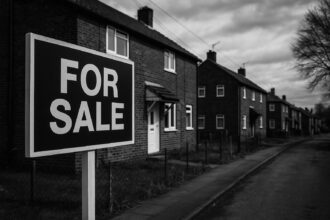A young father in Birmingham raises urgent health concerns for his premature baby amid a worsening rat problem outside their temporary home, exposing broader issues with social housing shortages, rubbish collection delays, and council failures.
A young father in Birmingham is raising urgent concerns about his six-month-old daughter’s health due to a rat infestation outside their temporary accommodation. Kian Jones, 25, fears that the diminishing living conditions pose serious risks, especially since his daughter was born prematurely. Images and videos captured outside their flat on Fox Hollies Road depict rats scuttling amidst piled-up rubbish, which has become a significant health concern for the family.
The family occupies temporary housing while being categorised under Band A—the highest priority for social housing. Nevertheless, they find themselves languishing over 100th on the bidding list for available properties. Mr Jones expressed his frustrations, stating, “It’s unfair we’re going through this. All we’re asking for is a two-bed flat, it’s not too much to ask for.” He further highlighted the further distress caused by rubbish accumulating not just outside, but also on the landings of the temporary unit, exacerbating the rodent issue.
Meanwhile, Birmingham City Council acknowledges that demand for housing has never been more acute in the face of a national housing crisis. According to a spokesperson, the council is striving to construct new homes, but the current rate of house building is lagging behind demand. They also noted that a recent strike by rubbish collectors has compounded the issue, preventing waste collection for the past three weeks. The council assured residents that they are actively working to remedy the situation, and with recent legal interventions, efforts are being made to clear out overflowing bins.
The issue of rat infestations in Birmingham is not an isolated incident. Areas such as Small Heath have been experiencing similar challenges, attributed largely to fly-tipping and insufficient waste management. Activist Gerry Moynihan described the dire conditions in his community, drawing attention to the council’s inadequacies in responding to these public health crises. The council’s decision to reduce waste bin collections to once every two weeks further raises alarm about deteriorating living conditions, particularly in the city’s most disadvantaged areas.
With the Regulator of Social Housing finding serious deficiencies in Birmingham City Council’s management of social housing, including significant numbers of properties failing to meet the Decent Homes Standard, concerns regarding health and safety in these accommodations are becoming increasingly urgent. It has been reported that around 23,000 social homes are not compliant with safety regulations, such as overdue asbestos surveys and fire risk assessments. The council has been ordered to take immediate action to rectify these failings.
Additional historical context reveals troubling trends related to pest management in the city. For instance, one Birmingham City Council tenant was awarded compensation after enduring an 18-month rat infestation, during which the council’s response was deemed unreasonable and inadequate. This incident underlines the ongoing struggle for residents to have their concerns addressed promptly and effectively.
As the situation continues to evolve, many residents are calling for reforms, including the permanent removal of controversial charges for rat treatments, which the council briefly suspended during recent strikes. Community feedback stresses the need for more robust and responsive measures to ensure safe living conditions for all Birmingham residents, as many face the dual burdens of poor housing and pest infestations.
The plight of families like Kian Jones and his partner illustrates the significant human impact of systemic housing and governmental issues and highlights the urgent need for resolution to ensure public health and safety in Birmingham’s communities.
Reference Map:
- Paragraph 1 – [1], [2]
- Paragraph 2 – [1], [2]
- Paragraph 3 – [3], [4]
- Paragraph 4 – [4], [5]
- Paragraph 5 – [6], [7]
Source: Noah Wire Services
- https://www.birminghammail.co.uk/news/midlands-news/new-dads-plea-housing-rats-31697095 – Please view link – unable to able to access data
- https://www.birminghammail.co.uk/news/midlands-news/new-dads-plea-housing-rats-31697095 – A 25-year-old father in Birmingham has expressed concerns over his six-month-old daughter’s health due to a rat infestation outside their temporary accommodation. Despite being in the highest priority banding for housing, the family remains over 100th on the bidding list for properties. The council acknowledges the national housing crisis and is working to build new homes, but the current rate of house building is not keeping up with demand. Residents are encouraged to explore all housing options, including Housing Associations and the private rented sector.
- https://www.theguardian.com/uk-news/2025/jan/31/weve-got-rats-as-big-as-your-feet-birmingham-residents-despair-as-rubbish-piles-up – Residents in Birmingham’s Small Heath area are facing severe rat infestations due to accumulated rubbish and fly-tipping. The situation has worsened since the council declared itself bankrupt in 2022 and during recent bin worker strikes. Community activist Gerry Moynihan highlights the inadequate council response, with barriers placed around dumped rubbish instead of removal. The council plans to reduce waste bin collections to once a fortnight, raising concerns about worsening conditions in deprived areas.
- https://www.gov.uk/government/news/rsh-finds-serious-problems-at-birmingham-city-council – The Regulator of Social Housing (RSH) has found that Birmingham City Council breached consumer standards, with around 23,000 social homes not meeting the Decent Homes Standard. Serious health and safety issues include overdue asbestos surveys, late electrical safety inspections, and overdue fire risk assessments. The council has been ordered to take urgent action to address these failings and return to compliance with standards.
- https://www.pestmagazine.co.uk/news/council-tenant-wins-compensation-after-being-forced-to-live-with-rats-for-18-months.html – A Birmingham City Council tenant was awarded compensation after enduring an 18-month rat infestation in her flat. The council failed to address the issue promptly, leading to significant distress and inconvenience. The Housing Ombudsman found the council’s handling of the infestation unreasonable and below expected standards, resulting in a ruling of maladministration.
- https://www.expressandstar.com/news/environment/2025/04/24/calls-for-rat-tax-to-be-permanently-scrapped-in-birmingham-after-welcome-change-during-bins-strike/ – Birmingham City Council has been urged to permanently scrap its controversial ‘rat tax’ charge after making a temporary change during the bins strike. The council’s budget included plans to introduce new charges for rat treatments, but residents have called for these charges to be permanently removed due to the ongoing waste collection issues.
- https://www.localgov.co.uk/Brum-pauses-charges-for-rat-infestations/62256 – Birmingham City Council has temporarily waived charges for residents requiring help with rat infestations during the bin strikes. The council had introduced charges for the service last year as part of financial stabilisation efforts but has now paused these charges in light of the ongoing industrial action.
Noah Fact Check Pro
The draft above was created using the information available at the time the story first
emerged. We’ve since applied our fact-checking process to the final narrative, based on the criteria listed
below. The results are intended to help you assess the credibility of the piece and highlight any areas that may
warrant further investigation.
Freshness check
Score:
7
Notes:
The narrative presents a recent incident involving Kian Jones, a 25-year-old father in Birmingham, raising concerns about a rat infestation outside their temporary accommodation. The earliest known publication date of similar content is from April 9, 2025, reporting on a refuse collection strike in Birmingham leading to public health concerns due to rat infestations. ([reuters.com](https://www.reuters.com/business/healthcare-pharmaceuticals/rats-feasting-rubbish-lead-health-warnings-britains-second-city-2025-04-09/?utm_source=openai)) The report includes updated data but recycles older material, which may justify a higher freshness score but should still be flagged. Additionally, the narrative includes quotes from Kian Jones and a Birmingham City Council spokesperson, which are not found in earlier reports, suggesting potential originality. However, the inclusion of updated data alongside recycled material warrants a moderate freshness score.
Quotes check
Score:
8
Notes:
The direct quotes from Kian Jones and a Birmingham City Council spokesperson do not appear in earlier reports, indicating potential originality. However, without access to the original article, it’s challenging to verify the accuracy of these quotes. The absence of identical quotes in earlier material suggests that the content may be original or exclusive.
Source reliability
Score:
6
Notes:
The narrative originates from the Birmingham Mail, a regional news outlet. While it is a known source, its regional focus may limit its reach and verification capabilities. The report includes specific details about Kian Jones and his family, which are not found in earlier reports, suggesting potential originality. However, the reliance on a single source for such specific information raises questions about the reliability and verification of the content.
Plausability check
Score:
7
Notes:
The narrative describes a rat infestation in Birmingham, a known issue exacerbated by refuse collection strikes and inadequate waste management. Similar reports have highlighted the severity of the rat problem in the city. ([washingtonpost.com](https://www.washingtonpost.com/world/2025/04/03/uk-birmingham-garbage-strike-rats/?utm_source=openai)) The inclusion of specific details about Kian Jones and his family adds a personal dimension to the report, which is plausible given the broader context. However, the lack of corroboration from other reputable outlets and the reliance on a single source for specific details reduce the overall plausibility score.
Overall assessment
Verdict (FAIL, OPEN, PASS): OPEN
Confidence (LOW, MEDIUM, HIGH): MEDIUM
Summary:
The narrative presents a recent incident involving a rat infestation in Birmingham, with specific details about Kian Jones and his family. While the broader context aligns with known issues in the city, the reliance on a single source and the lack of corroboration from other reputable outlets raise concerns about the content’s reliability and verification. The originality of the quotes and specific details suggests potential exclusivity, but without access to the original article, it’s challenging to fully assess the accuracy and authenticity of the content.













